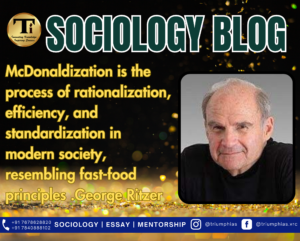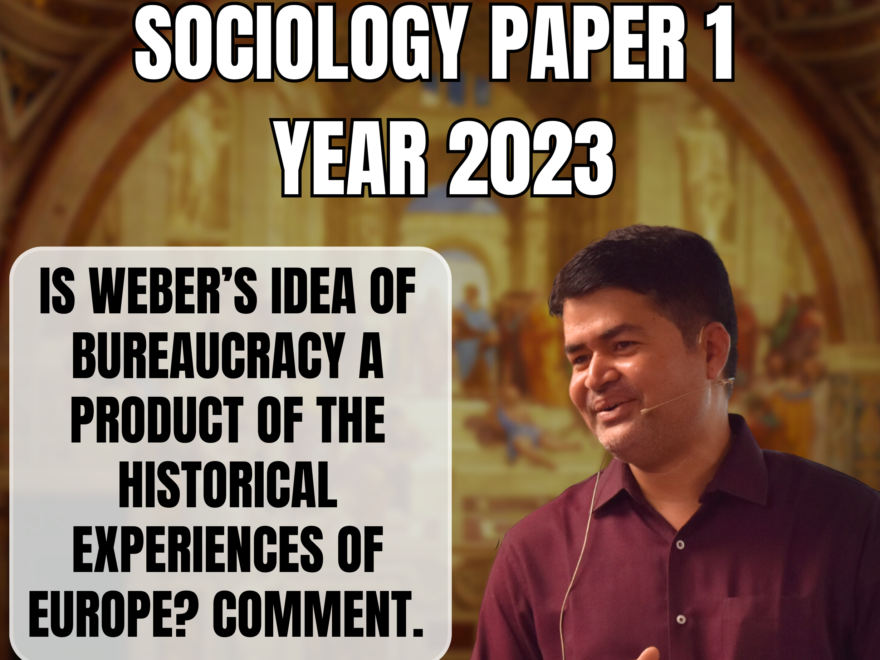Is Webers idea of bureaucracy a product of the historical experiences of Europe? Comment
Section: A.
Sociology Paper 2023 Analysis.
Relevant for Paper 1: Unit 4 Sociological Thinker

Question 3 (c): Is Webers idea of bureaucracy a product of the historical experiences of Europe? Comment.
(10 Marks)
|
Introduction: Definition of Bureaucracy Propounded by Weber. Main Body: Explaining Historical Conditions of Europe Shaping the Conceptual Idea of Bureaucracy Like Modern Nation State , Industrialization and Urbanisation, Nepotism and Patronage Issues, rise of Legal Rational Authorities etc. Conclusion: On the Lines that the Social Context Shapes the Ideas of Time Period as in Case of Weber. |
Introduction:
Weber defined bureaucracy as a formal form of authority that is based on written rules and regulations. Weber’s definition of bureaucracy includes formal hierarchy, division of labor, impersonal rules, merit-based employment, career orientation, record-keeping, and a professional ethos, emphasizing efficiency and fairness in administrative organizations. Max Weber’s concept of bureaucracy is indeed influenced by the historical experiences of Europe, particularly the late 19th and early 20th centuries.
Main body:
Bureaucracy: product of historical experience
- Industrialisation firstly took place in Europe. Over a period of time the work organisation became very specialised. It became rules and regulations driven. It came to be organised on the basis of a fixed chain of command. To increase efficiency and objectivity, employees in work organisations as well as functionaries of government were required to follow objective guidelines and were recruited on the basis of specialised division of labour.
- Weber’s work was deeply rooted in the specific historical and cultural context of Germany and Europe at the time. His observations and analysis of bureaucracy were influenced by his experiences with the German bureaucracy, as well as broader European administrative practices. This context played a significant role in shaping his understanding of bureaucracy.
- Europe during this period also saw the emergence of modern nation-states with expanding bureaucracies. The expansion of state functions and the need to govern diverse populations required a more rational and formal system of administration. Weber’s model of bureaucracy emphasized the rationality and formalization of administrative processes, making it suitable for the needs of the modern state.
- Weber’s idea of bureaucracy was, in part, a reaction to the prevalent issues of nepotism and patronage in European administrative systems. He advocated for a merit-based system of hiring and promotion, which would help create a more efficient and impartial bureaucracy.
- Weber’s ideas had a profound impact on administrative reforms in Europe during the 20th century. Many European countries adopted elements of his bureaucratic model in their public administration systems to improve efficiency, transparency, and accountability.
Conclusion:
The features and challenges associated with bureaucracy though shaped by European experience of Weber holds relevance even today. Bureaucracy remains relevant due to its role in ensuring stability, rule of law, and efficient public administration. McDonaldization and the iron cage of rationality concepts highlight the need for balancing efficiency with human needs in a diverse and complex society.
Related Blogs…
 |
 |

To master these intricacies and fare well in the Sociology Optional Syllabus, aspiring sociologists might benefit from guidance by the Best Sociology Optional Teacher and participation in the Best Sociology Optional Coaching. These avenues provide comprehensive assistance, ensuring a solid understanding of sociology’s diverse methodologies and techniques.
META TAGS:
Iron Law of Oligarchy, Robert Michels, Vilfredo Pareto, Lions and Foxes theory, power dynamics, organizational oligarchy, elite circulation, political sociology, leadership styles, organizational control, sociological theories, political maneuvering, elite differentiation, power concentration, societal stability, political leadership, strategic political leadership, Sociology Question Paper, Sociology Question Paper 2023, Sociology Question Paper CYQ, Sociology Question Paper UPSC, What, according to Robert Michels, is the iron law of oligarchy? Do lions and foxes in Vilfredo Pareto’s theory, essentially differ from each other? Substantiate.
Why Vikash Ranjan’s Classes for Sociology?
Proper guidance and assistance are required to learn the skill of interlinking current happenings with the conventional topics. VIKASH RANJAN SIR at TRIUMPH IAS guides students according to the Recent Trends of UPSC, making him the Best Sociology Teacher for Sociology Optional UPSC.
At Triumph IAS, the Best Sociology Optional Coaching platform, we not only provide the best study material and applied classes for Sociology for IAS but also conduct regular assignments and class tests to assess candidates’ writing skills and understanding of the subject.
Choose The Best Sociology Optional Teacher for IAS Preparation?
At the beginning of the journey for Civil Services Examination preparation, many students face a pivotal decision – selecting their optional subject. Questions such as “which optional subject is the best?” and “which optional subject is the most scoring?” frequently come to mind. Choosing the right optional subject, like choosing the best sociology optional teacher, is a subjective yet vital step that requires a thoughtful decision based on facts. A misstep in this crucial decision can indeed prove disastrous.
Ever since the exam pattern was revamped in 2013, the UPSC has eliminated the need for a second optional subject. Now, candidates have to choose only one optional subject for the UPSC Mains, which has two papers of 250 marks each. One of the compelling choices for many has been the sociology optional. However, it’s strongly advised to decide on your optional subject for mains well ahead of time to get sufficient time to complete the syllabus. After all, most students score similarly in General Studies Papers; it’s the score in the optional subject & essay that contributes significantly to the final selection.
“A sound strategy does not rely solely on the popular
Opinion of toppers or famous YouTubers cum teachers.”
It requires understanding one’s ability, interest, and the relevance of the subject, not just for the exam but also for life in general. Hence, when selecting the best sociology teacher, one must consider the usefulness of sociology optional coaching in General Studies, Essay, and Personality Test.
The choice of the optional subject should be based on objective criteria, such as the nature, scope, and size of the syllabus, uniformity and stability in the question pattern, relevance of the syllabic content in daily life in society, and the availability of study material and guidance. For example, choosing the best sociology optional coaching can ensure access to top-quality study materials and experienced teachers. Always remember, the approach of the UPSC optional subject differs from your academic studies of subjects. Therefore, before settling for sociology optional, you need to analyze the syllabus, previous years’ pattern, subject requirements (be it ideal, visionary, numerical, conceptual theoretical), and your comfort level with the subject.
This decision marks a critical point in your UPSC – CSE journey, potentially determining your success in a career in IAS/Civil Services. Therefore, it’s crucial to choose wisely, whether it’s the optional subject or the best sociology optional teacher. Always base your decision on accurate facts, and never let your emotional biases guide your choices. After all, the search for the best sociology optional coaching is about finding the perfect fit for your unique academic needs and aspirations.
Follow us :
🔎 https://www.instagram.com/triumphias
🔎 https://www.youtube.com/c/TriumphIAS
🔎 https://t.me/VikashRanjanSociology
Find More Blogs…
| Compare and contrast Karl Marx’s and Max weber’s | Karl Marx- Historical Materialism |
| Position of Women In the Modern Indian Society | Sociology: Social system and pattern variables |
KEYWORD: bureaucracy a product of the historical experiences of Europe, bureaucracy a product of the historical experiences of Europe, bureaucracy a product of the historical experiences of Europe, bureaucracy a product of the historical experiences of Europe, bureaucracy a product of the historical experiences of Europe, bureaucracy a product of the historical experiences of Europe, bureaucracy a product of the historical experiences of Europe, bureaucracy a product of the historical experiences of Europe,



